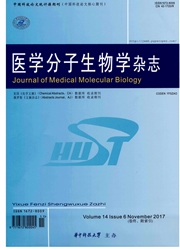

 中文摘要:
中文摘要:
朊病毒病是一组蛋白质折叠异常的蛋白质构象病,由正常朊蛋白PrP^C转化为具蛋白酶抗性的异常朊蛋白PrP^Sc并在中枢神经系统聚集引起.其主要的病理变化为神经元的丢失,脑组织的海绵样变及神经胶质细胞增生.目前认为其神经元丢失的主要原因为凋亡及自噬等,而神经元的凋亡涉及多种因素及途径,机制较为复杂.对神经元凋亡的研究将有助于揭示朊病毒病的发病机制.
 英文摘要:
英文摘要:
Prion diseases are a group of protein conformational diseases attributable to inaccurate protein folding. They are caused by the accumulation of the abnormal protease resistant prion protein (PrP^Sc) from the post-translational conversion of the normal host-encoded PrP^C in the central nervous system (CNS) . Prion diseases are characterized by neuronal loss, spongiosis, reactive astrocytosis, and microgliosis. At present it is thought that the main cause of neuronal loss is apoptosis and autophagy, while neuronal apoptosis is associated with many factors and pathways. The study of neuronal apoptosis contributes to the unearthing of the mechanism of prion diseases.
 同期刊论文项目
同期刊论文项目
 同项目期刊论文
同项目期刊论文
 Mouse-adapted scrapie strains 139A and ME7 overcome species barrier to induce experimental scrapie i
Mouse-adapted scrapie strains 139A and ME7 overcome species barrier to induce experimental scrapie i Immune responses in wild-type mice against prion proteins induced using a DNA prime-protein boost st
Immune responses in wild-type mice against prion proteins induced using a DNA prime-protein boost st Raised levels of tau protein in CSF of Chinese patients with probable diagnostic Creutzfeldt-Jakob d
Raised levels of tau protein in CSF of Chinese patients with probable diagnostic Creutzfeldt-Jakob d The octarepeats of hamster PrP (PrP51-91) enhance the formation microtubule and antagonize Cu2+-indu
The octarepeats of hamster PrP (PrP51-91) enhance the formation microtubule and antagonize Cu2+-indu PrPSc of scrapie 263K propagates efficiently in spleen and muscle tissues with protein misfolding cy
PrPSc of scrapie 263K propagates efficiently in spleen and muscle tissues with protein misfolding cy Molecular interaction of TPPP with PrP antagonized the CytoPrP-induced disruption of microtubule str
Molecular interaction of TPPP with PrP antagonized the CytoPrP-induced disruption of microtubule str Familial CJD associated PrP mutants within transmembrane region induced retention of Ctm-PrP in ER a
Familial CJD associated PrP mutants within transmembrane region induced retention of Ctm-PrP in ER a A novel PrP partner HS-1 associated protein X-1 (HAX-1) protected the cultured cells against the cha
A novel PrP partner HS-1 associated protein X-1 (HAX-1) protected the cultured cells against the cha The epidemiological, clinical and laboratory features of sporadic Creutzfeldt-Jakob disease patients
The epidemiological, clinical and laboratory features of sporadic Creutzfeldt-Jakob disease patients The diversities of PrPSc distributions and pathologic changes in various brain regions from a Chines
The diversities of PrPSc distributions and pathologic changes in various brain regions from a Chines Comparative peptidome analyses of the profiles of the peptides ranging from 1 to 10 KD in CSF sample
Comparative peptidome analyses of the profiles of the peptides ranging from 1 to 10 KD in CSF sample Knocking-down of the levels of prion protein by RNA interference (RNAi) weakened the protective acti
Knocking-down of the levels of prion protein by RNA interference (RNAi) weakened the protective acti Remarkable reduction of MAP2 in the brains of scrapie-infected rodents and human prion disease possi
Remarkable reduction of MAP2 in the brains of scrapie-infected rodents and human prion disease possi Transient expressions of doppel and its structural analog prionΔ32-121 inSH-SY5Y cells caused cytoto
Transient expressions of doppel and its structural analog prionΔ32-121 inSH-SY5Y cells caused cytoto Molecular interaction of alpha-synuclein with tubulin influences onthe polymerization of microtubule
Molecular interaction of alpha-synuclein with tubulin influences onthe polymerization of microtubule Changes of tau profiles in brains of the hamsters infected with scrapie strains263K or 139A possibly
Changes of tau profiles in brains of the hamsters infected with scrapie strains263K or 139A possibly Manganese induced changes of the biochemical characteristics of therecombinant wild-type and mutated
Manganese induced changes of the biochemical characteristics of therecombinant wild-type and mutated Cytosolic prion protein induces apoptosis inhuman neuronal cell SH-SY5Y via mitochondrial disruption
Cytosolic prion protein induces apoptosis inhuman neuronal cell SH-SY5Y via mitochondrial disruption The propagation of hamster-adapted scrapie PrPSc can be enhanced by reduced pyridine nucleotide in v
The propagation of hamster-adapted scrapie PrPSc can be enhanced by reduced pyridine nucleotide in v Human prion protein mutants with deleted and inserted octarepeats undergo in different pathways to t
Human prion protein mutants with deleted and inserted octarepeats undergo in different pathways to t 期刊信息
期刊信息
